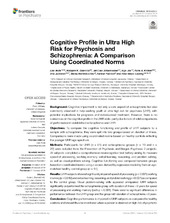| dc.contributor.author | Anda-Ågotnes, Liss Gøril | |
| dc.contributor.author | Brønnick, Kolbjørn Kallesten | |
| dc.contributor.author | Johannessen, Jan Olav | |
| dc.contributor.author | Joa, Inge | |
| dc.contributor.author | Kroken, Rune Andreas | |
| dc.contributor.author | Johnsen, Erik | |
| dc.contributor.author | Rettenbacher, Maria | |
| dc.contributor.author | Fathian, Farivar | |
| dc.contributor.author | Løberg, Else-Marie | |
| dc.date.accessioned | 2020-08-18T07:25:34Z | |
| dc.date.available | 2020-08-18T07:25:34Z | |
| dc.date.issued | 2019-10-01 | |
| dc.Published | Anda-Ågotnes LG, Brønnick KK, Johannessen JO, Joa I, Kroken R, Johnsen E, Rettenbacher M, Fathian F, Løberg E-M. Cognitive profile in ultra high risk for psychosis and schizophrenia: A comparison using coordinated norms. Frontiers in Psychiatry. 2019;10:695 | eng |
| dc.identifier.issn | 1664-0640 | |
| dc.identifier.uri | https://hdl.handle.net/1956/23836 | |
| dc.description.abstract | Background: Cognitive impairment is not only a core aspect of schizophrenia but also commonly observed in help-seeking youth at ultra high risk for psychosis (UHR), with potential implications for prognosis and individualized treatment. However, there is no consensus on the cognitive profile in the UHR state, partly due to lack of valid comparisons of performance in established schizophrenia and UHR. Objectives: To compare the cognitive functioning and profile of UHR subjects to a sample with schizophrenia, they were split into two groups based on duration of illness. Comparisons were made using coordinated norms based on healthy controls reflecting the younger UHR age spectrum. Methods: Participants for UHR (n = 51) and schizophrenia groups (n = 19 and n = 22) were included from the Prevention of Psychosis and Bergen Psychosis 2 projects. All subjects completed a comprehensive neurocognitive test battery aiming to measure speed of processing, working memory, verbal learning, reasoning, and problem solving, as well as visual problem solving. Cognitive functioning was compared between groups based on coordinated norms using z-scores derived by regression modeling from an age-matched healthy control group (n = 61). Results: UHR subjects showed significantly impaired speed of processing (p < 0.001) working memory (p = 0.042) and verbal learning, reasoning, and problem solving (p = 0.007) as compared to the control group. Visual problem-solving skills appeared unimpaired. UHR subjects significantly outperformed the schizophrenia group with duration of illness >3 years for speed of processing and working memory (both p < 0.001). There were no significant differences in performance between the UHR group and the group with duration of schizophrenia <3 years. Conclusion: Cognitive performance is impaired in UHR subjects as compared to healthy controls and should thus be monitored when a person is deemed at high risk of psychotic illness. Spatial skills, as measured by tests using physical objects, appear less affected than other domains. The pattern of impairment is similar to that of a group with recent onset schizophrenia but is less severe than in a group with duration of illness <3 years. | en_US |
| dc.language.iso | eng | eng |
| dc.publisher | Frontiers | eng |
| dc.rights | Attribution CC BY | eng |
| dc.rights.uri | http://creativecommons.org/licenses/by/4.0/ | eng |
| dc.title | Cognitive profile in ultra high risk for psychosis and schizophrenia: A comparison using coordinated norms | eng |
| dc.type | Peer reviewed | |
| dc.type | Journal article | |
| dc.date.updated | 2020-02-05T18:00:55Z | |
| dc.description.version | publishedVersion | |
| dc.rights.holder | Copyright 2019 The Authors | eng |
| dc.identifier.doi | https://doi.org/10.3389/fpsyt.2019.00695 | |
| dc.identifier.cristin | 1749386 | |
| dc.source.journal | Frontiers in Psychiatry | |
| dc.relation.project | Universitetet i Stavanger: IN-11551 | |

